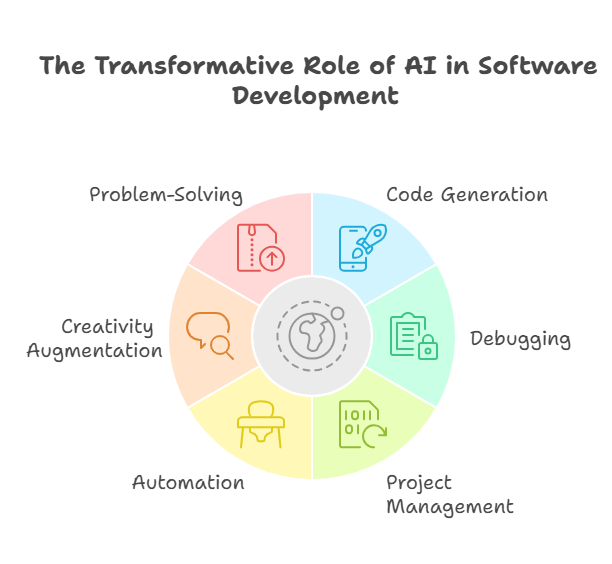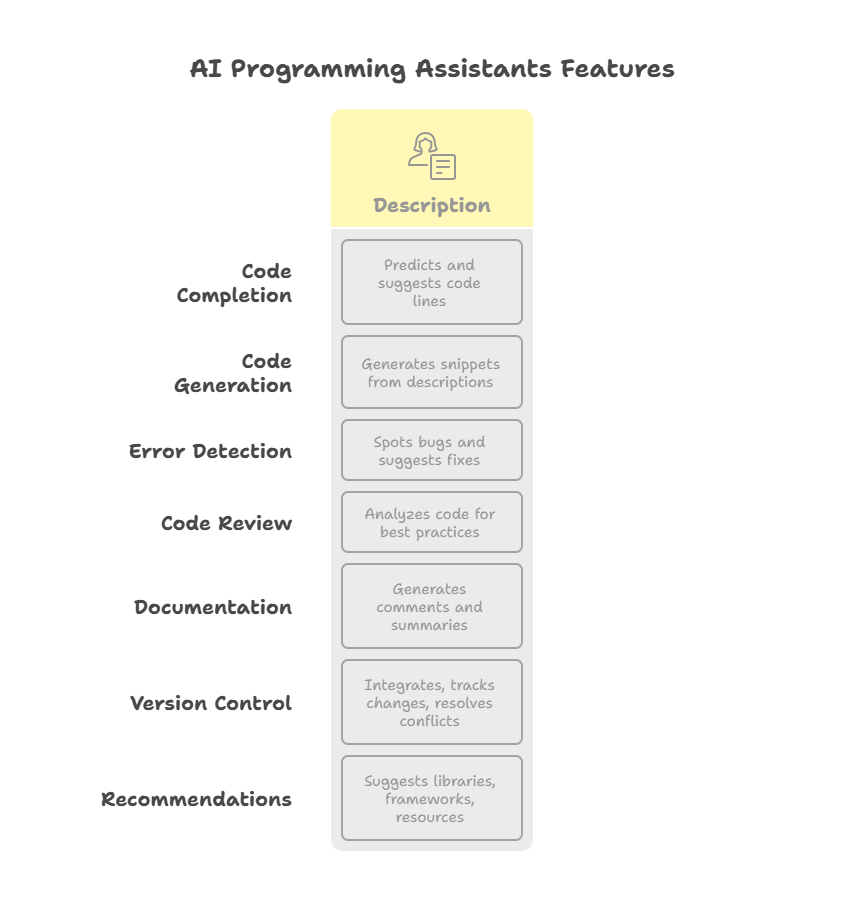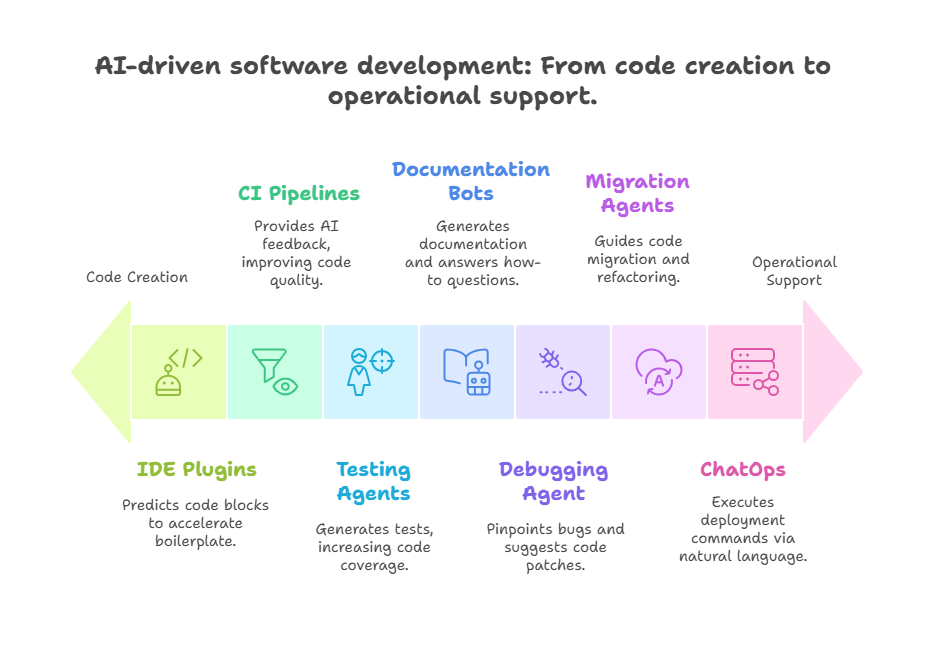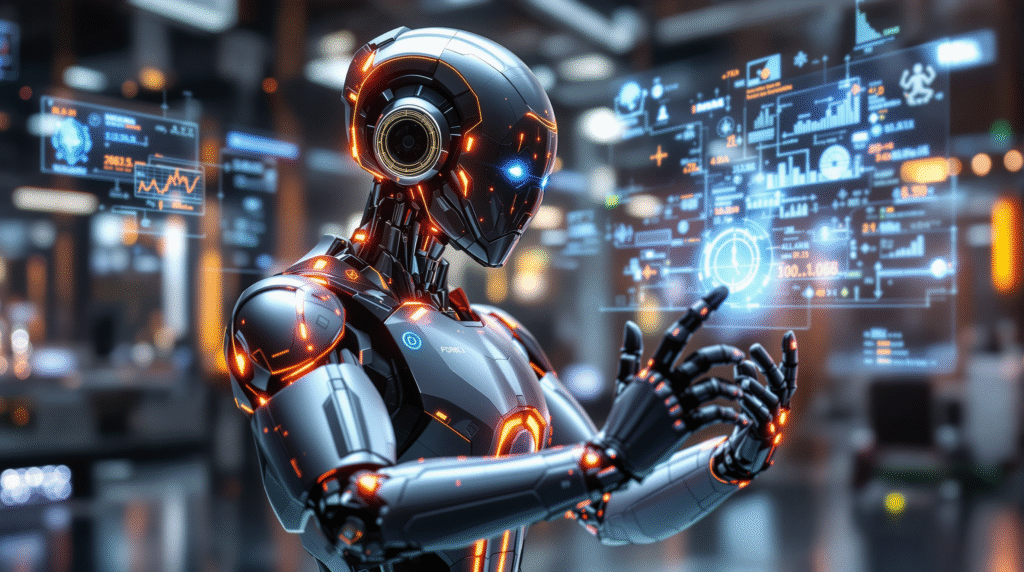Introduction: The Rise of AI in Software Development
Artificial intelligence is rapidly transforming the landscape of software development. In recent years, AI-powered tools have become an integral part of the programmer’s toolkit, supporting everything from code generation to debugging and project management. The growing complexity of software systems, combined with the demand for faster delivery and higher quality, has driven the adoption of intelligent solutions that can automate repetitive tasks and provide valuable insights.
The rise of AI in software development is not just about automation. It’s about augmenting human creativity and problem-solving with machine intelligence. AI assistants can analyze vast amounts of code, learn from best practices, and suggest improvements that might not be immediately obvious to even experienced developers. As a result, teams can focus more on innovation and less on routine work, making the development process more efficient and enjoyable.

What Is an AI Programming Assistant?
An AI programming assistant is a software tool or agent that leverages artificial intelligence to support developers throughout the software development lifecycle. These assistants use advanced algorithms, including natural language processing and machine learning, to understand code, documentation, and even spoken or written queries from programmers.
Modern AI programming assistants can help with a wide range of tasks. They can generate code snippets based on descriptions, suggest fixes for bugs, recommend best practices, and even automate code reviews. Some assistants integrate directly into popular development environments, offering real-time suggestions as you type. Others can analyze entire codebases, identify potential issues, and propose optimizations.
The core idea behind an AI programming assistant is to act as a smart collaborator—one that learns from your coding style, adapts to your workflow, and helps you become more productive. By handling repetitive or complex tasks, these assistants free up developers to focus on creative problem-solving and building innovative solutions.
Key Features and Capabilities
AI programming assistants offer a diverse set of features designed to streamline and enhance the work of developers. One of their most valuable capabilities is intelligent code completion, where the assistant predicts and suggests the next lines of code based on context, project structure, and even the developer’s personal style. These tools can also automatically generate code snippets from natural language descriptions, making it easier to translate ideas into working code.
Another important feature is real-time error detection and debugging support. AI assistants can spot potential bugs as you write, highlight problematic code, and often suggest specific fixes or improvements. Many assistants are equipped with code review functionalities, analyzing code for adherence to best practices, security vulnerabilities, and performance issues. They can also help with documentation, automatically generating comments or summaries for functions and classes, which improves code readability and maintainability.
Some advanced AI assistants integrate with version control systems, track changes, and even help resolve merge conflicts. They can recommend relevant libraries or frameworks, assist in refactoring code, and provide learning resources tailored to the developer’s needs. By combining these capabilities, AI programming assistants become powerful partners in the software development process.

Integrating AI Assistants into Your Workflow
Bringing an AI programming assistant into your daily workflow is a straightforward process, especially with the growing number of tools that seamlessly integrate with popular development environments. Most AI assistants are available as plugins or extensions for IDEs like Visual Studio Code, JetBrains, or even browser-based editors. Once installed, they work in the background, offering suggestions, code completions, and insights as you type.
To get the most out of an AI assistant, it’s important to configure it according to your project’s needs and your personal preferences. Many tools allow you to customize the level of assistance, choose which languages or frameworks to focus on, and even train the assistant on your own codebase for more personalized recommendations. Integrating an AI assistant also means adapting your workflow to take advantage of its strengths—using it for brainstorming, code reviews, or automating repetitive tasks.
Collaboration is another key aspect. In team settings, AI assistants can help maintain code consistency, enforce standards, and facilitate knowledge sharing. By integrating these tools into your workflow, you not only boost productivity but also create a more supportive and innovative development environment.
Real-World Use Cases
Code Generation & Autocomplete
• IDE plug-ins (e.g., Copilot, Codeium) predict entire blocks, speeding up boilerplate writing.
• Chat-style agents turn natural-language tickets into working functions or micro-services.
Automated Code Review
• CI pipelines post AI feedback on pull requests (style, complexity, security).
• Large orgs use LLMs to flag OWASP issues before human review, cutting review time by ~30 %.
Test-Case Generation
• Agents read source files, create unit / integration tests, and measure coverage.
• Start-ups report doubling coverage within weeks without extra QA hires.
Documentation on Demand
• Docstring or API docs generated from code comments.
• Internal bots answer “how-to” questions by searching codebases and design docs.
Bug Localization & Fix Suggestions
• During debugging, the agent pinpoints suspect lines and proposes patches.
• Production incident response is faster—some teams patch low-risk issues automatically.
Code Migration & Refactoring
• Legacy Python 2 → 3 or Java → Kotlin migrations guided by AI, preserving behavior tests.
• Agents suggest idiomatic patterns and remove tech debt.
DevOps & ChatOps
• Natural-language deployment commands (“rollback staging to previous tag”) executed safely.
• On-call engineers query logs in plain English and get structured insights.

Benefits for Developers
• Higher Productivity — Less boilerplate and faster prototyping.
• Better Code Quality — Continuous feedback on style, security, and performance.
• Accelerated Learning — Real-time examples and explanations boost skill acquisition.
• Cognitive Relief — Routine tasks offloaded, freeing mental capacity for design work.
• Cross-Language Reach — Agents translate idioms, letting devs contribute outside their primary stack.
• Shorter Onboarding — New hires query the bot instead of sifting through wikis.
Python Demo ➜ Test Generation & Code Review with an LLM
Below is a minimal example that shows how an AI assistant can (1) generate pytest tests for a given function and (2) review a Git diff.
Set OPENAI_API_KEY in your environment before running.
python
import os
import openai
openai.api_key = os.getenv("OPENAI_API_KEY")
MODEL = "gpt-4o-mini" # or any compatible model ID
# 1️⃣ Generate unit tests
def generate_unit_tests(code: str) -> str:
prompt = (
"You are a senior Python tester. "
"Write thorough pytest unit tests for the following function:\n\n"
f"{code}\n"
)
resp = openai.ChatCompletion.create(
model=MODEL,
messages=[{"role": "user", "content": prompt}],
temperature=0.2,
)
return resp.choices[0].message.content.strip()
# 2️⃣ Review a git diff
def review_code_diff(diff: str) -> str:
prompt = (
"Act as a strict code reviewer. Identify bugs, security issues, "
"and improvement suggestions in this diff:\n\n"
f"{diff}\n"
)
resp = openai.ChatCompletion.create(
model=MODEL,
messages=[{"role": "user", "content": prompt}],
temperature=0.1,
)
return resp.choices[0].message.content.strip()
if __name__ == "__main__":
source_function = """
def is_prime(n: int) -> bool:
\"\"\"Return True if n is a prime number.\"\"\"
if n <= 1:
return False
for i in range(2, int(n ** 0.5) + 1):
if n % i == 0:
return False
return True
"""
print("=== Generated Tests ===")
print(generate_unit_tests(source_function))
sample_diff = """
diff --git a/math_utils.py b/math_utils.py
@@
- for i in range(2, int(n ** 0.5) + 1):
+ for i in range(2, int(n**0.5)+1):
if n % i == 0:
return False
"""
print("\n=== AI Code Review ===")
print(review_code_diff(sample_diff))Run the script and observe:
A set of ready-to-paste pytest cases covering edge inputs.
A concise review of the diff, flagging readability, spacing, or potential logical errors.
Challenges and Limitations
While AI programming assistants offer significant advantages, they also introduce new challenges and limitations that developers must consider. One of the primary concerns is the accuracy and reliability of AI-generated code. Although these assistants can produce impressive results, they may occasionally suggest solutions that are incorrect, inefficient, or even insecure. Relying too heavily on AI without proper validation can lead to subtle bugs or vulnerabilities slipping into production code.
Another challenge is the risk of overfitting to existing patterns. AI models are trained on vast datasets of public code, which means they might reinforce outdated practices or propagate common mistakes found in open-source repositories. Additionally, there are concerns about intellectual property and licensing, as some generated code may inadvertently reproduce copyrighted material.
Integration with existing workflows can also be a hurdle. Not all teams are ready to adapt their processes to accommodate AI tools, and there may be resistance from developers who prefer traditional methods. Furthermore, AI assistants require access to codebases and sometimes sensitive data, raising questions about privacy and data security.
Finally, there is the issue of explainability. AI-generated suggestions can sometimes appear as “black boxes,” making it difficult for developers to understand the reasoning behind a particular recommendation. This can hinder trust and slow down adoption, especially in critical or highly regulated environments.
Best Practices for Effective Collaboration
To maximize the benefits of AI programming assistants while minimizing risks, it’s important to adopt best practices for collaboration between humans and AI. First, always treat AI-generated code as a starting point rather than a final solution. Developers should review, test, and validate all suggestions, ensuring they meet project standards and requirements.
Establishing clear guidelines for when and how to use AI assistants can help maintain consistency and quality. For example, teams might decide to use AI for boilerplate code, documentation, or initial drafts, but require manual review for complex logic or security-sensitive components. Regular code reviews and automated testing should remain integral parts of the workflow, providing an additional layer of assurance.
Transparency is also crucial. Encourage developers to document when and why AI-generated code is used, making it easier to track changes and understand the rationale behind certain decisions. Training and onboarding sessions can help team members become comfortable with AI tools, fostering a culture of continuous learning and adaptation.
Finally, monitor the performance and impact of AI assistants over time. Collect feedback from developers, track metrics such as code quality and productivity, and adjust practices as needed. By combining the strengths of both human expertise and artificial intelligence, teams can create a more efficient, innovative, and resilient development environment.
The Future of AI Programming Assistants
The future of AI programming assistants looks exceptionally promising, with rapid advancements in both the underlying technology and its practical applications. As large language models and generative AI continue to evolve, assistants will become even more context-aware, capable of understanding not just code syntax but also project goals, architectural patterns, and team conventions. This deeper understanding will allow AI to provide more relevant, precise, and creative suggestions, making it an even more valuable partner in software development.
We can expect AI assistants to move beyond simple code completion and debugging, taking on more complex roles such as automated architecture design, intelligent refactoring, and even proactive identification of technical debt. Integration with other tools—like project management platforms, CI/CD pipelines, and cloud services—will become more seamless, enabling end-to-end automation of many development tasks.
Another exciting direction is the rise of multi-agent systems, where several specialized AI agents collaborate on different aspects of a project, from code generation to security auditing and documentation. These agents will be able to communicate and coordinate, further amplifying productivity and code quality. As AI becomes more explainable and transparent, trust in its recommendations will grow, making it a standard part of every developer’s toolkit.
However, the future will also bring new challenges, such as ensuring ethical use, maintaining data privacy, and addressing the evolving skill set required for developers to work effectively alongside AI. Continuous learning and adaptation will be essential as the boundaries between human and machine contributions become increasingly blurred.
Conclusion
AI programming assistants are transforming the way software is developed, offering unprecedented support for developers at every stage of the process. From generating code and automating tests to providing real-time feedback and facilitating collaboration, these tools are reshaping the daily work of programmers and raising the bar for productivity and code quality.
While challenges remain—such as ensuring reliability, maintaining security, and fostering trust—the benefits of AI assistants are already clear. By embracing these technologies thoughtfully and responsibly, developers and teams can unlock new levels of efficiency, creativity, and innovation. The future of programming is not about replacing humans with machines, but about empowering people to achieve more with the help of intelligent, adaptable AI partners. As this technology continues to mature, it will become an indispensable ally in building the software of tomorrow.
AI Agents: Building intelligent applications with ease


